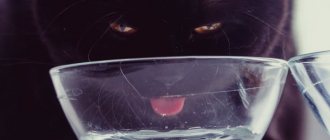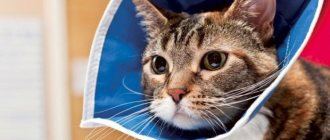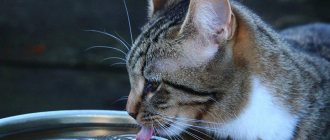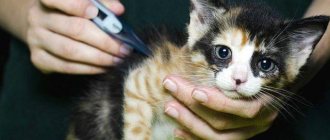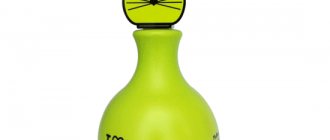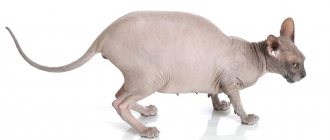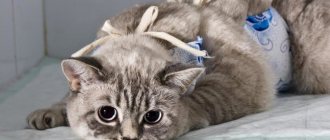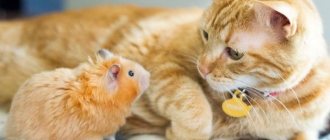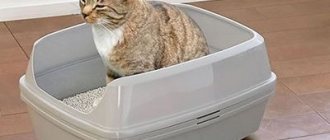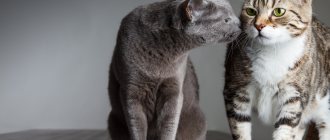12131Administration
All was good. It would seem that there are no problems. And here’s the news: the pet began to refuse food. Even offering him something tasty, you understand that all efforts to feed him are overshadowed by failures.
Owners often ask: how long can a cat live without food before you have time to take him to the vet? Why did my pet stop eating? The answer is sometimes hidden on the surface, and sometimes lies very deep. Let's look at the pros and cons of this problem.
Reasons why cats and kittens refuse food and water
A cat’s refusal to eat and drink should immediately alert a caring owner, as this almost always indicates the presence of some kind of problem. The animal cannot tell what is bothering it, but the pet’s reluctance to eat is a definite signal that not everything is all right with it. There are quite a few reasons for such unnatural behavior, but it is important for the owner to promptly identify the correct one and eliminate it:
- Stress. The cat gets very used to the established order of things. Moreover, any changes in its usual lifestyle and environment have a very negative impact on the condition of the animal. Moving, renovations, long-term absence of the owner, or the arrival of guests can cause stress in the pet, due to which it may refuse to eat and drink for a while. At the same time, his behavior will change, becoming lethargic and apathetic or aggressive. But at the same time, cats adapt quite quickly to everything new, so such a forced hunger strike usually does not last long - not even a few days will pass before the pet returns to its usual rhythm and way of life.
- Sudden changes in diet. Due to inexperience, many owners make a serious mistake when experimenting with the choice of food for their pet, while dramatically changing its diet. The cat is very attentive and picky about what it eats. If food is unusual for it, the animal may simply refuse it. This does not mean that the food is of poor quality; on the contrary, a cat may refuse more nutritious food simply because it is unfamiliar with it. As a rule, this behavior is observed for several days, after which the pet gets used to the new food.
- Climate change. A sharp change in climatic conditions has an extremely bad effect not only on humans, but also on animals. There is such a thing as acclimatization - essentially, the restructuring of the body to new environmental factors. This process is characterized by some deterioration in the health and behavior of the animal, including refusal to eat food and water. Fortunately, these disorders are reversible and go away quite quickly.
- Period of sexual desire. During estrus, cats produce special hormones that can affect the animal's behavior and appetite. At this time, the pet may be aggressive, restless and refuse food and water for a long time. In some cases, a cat's hormonal levels can be so disrupted that refusal to eat and eat can cause the animal to become exhausted. In this case, the pet should be taken to a veterinarian for consultation and possible treatment.
- Disease. Cats are very susceptible to various kinds of infectious diseases (for example, calcivirus). Symptoms of diseases are varied, but the common thing for most of them is refusal to eat food and water. It is worth noting that this condition requires mandatory seeking veterinary help, as it threatens severe exhaustion of the pet and its death. A common disease that occurs mainly in cats is urolithiasis. Mostly mature animals suffer from it, but if the quality of food is poor, young animals can also get sick. Refusal of food and water is a leading sign of exacerbation of this disease. Only a veterinarian can diagnose and treat urolithiasis.
- Worm infestations can also cause a permanent deterioration in a cat's health. There is no point in delaying ridding your animal of parasites, as this is fraught with extremely unfavorable consequences.
- Fright. Despite high adaptive capabilities and a strong nervous system, fear caused by a factor dangerous to the animal (a dog attack, for example), can cause the cat to refuse to eat food and water for a while. At this time, the pet should be surrounded by the care and attention of its owner. When the stress factor is eliminated, the cat will regain its appetite.
- Dental problems. Stomatitis, caries, tartar are a common reason why a cat refuses to eat and drinks only water, since eating food causes her discomfort and pain.
- Heat. During the heat, cats experience obvious discomfort and consume a lot of liquid, and their appetite, on the contrary, decreases. This condition in itself is not dangerous, but only if the cat has constant access to drinking water.
If your cat suddenly begins to refuse food and you cannot independently identify the cause, you should contact your veterinarian.
A few years ago, my cat also refused to eat for a while. The fact is that craftsmen came to me to install a hood in the kitchen, where my pet’s food and water bowls stood. The cat was so scared that she simply did not come near the kitchen for two days. When I noticed this, I simply moved the bowls to another room for a while. So if your pet doesn't come to the bowl, try to remember if strangers came to you.
Video: why a cat refuses food and water
Real stories about cats who had to starve for a long time
One of the most surprising cases of prolonged starvation of cats occurred in 2007 in the USA, where a weakened and very emaciated animal, but still showing signs of life, was found in one of the local ports in a tightly closed container. As a result of long investigations into how it could have ended up there, it was possible to establish all the facts of what happened.
The container that the cat accidentally entered was loaded onto a ship in the Shanghai port that left the pier on April 3. He arrived at his destination only on May 7, which is when the cat was discovered on him. In total, the four-legged traveler did not have a drop of dew in his mouth for 35 days. The further fate of China, and this is the name given to the cat that showed miracles of endurance and vitality, is unknown, but the incident that happened to her became one of the amazing examples of the vitality of representatives of the cat family.
How long can a cat and cat live without food and water?
When talking about how long a cat can live without water and food, it is worth taking into account the health and age of the animal. It is obvious that an adult and healthy individual can more easily tolerate a forced head, in contrast to, say, sick, weakened pets and kittens.
Adult healthy pet
An adult animal can go without food for about 10 days. The lack of water is more critical for the cat, but even in this case it will live for 5–6 days. Of course, the length of these periods should not reassure attentive owners. It is normal if a cat refuses to eat and drink for 2 days, after which the body becomes exhausted, and to save the pet’s life, measures must be taken, the nature of which depends on the reasons that caused the hunger strike.
Adult sick or weakened pet
Lack of appetite or refusal of water by a sick pet is a dangerous sign, since such an animal can live no more than 3 days. Refusal of a weakened cat from food and water for more than a day is a serious cause for concern.
Old cat or cat
As cats age, their metabolism slows down, and their protective and adaptive capabilities become much worse. Therefore, any refusal of food and water in animals over 8 years of age should be considered a serious pathology. An old cat can live without food and water for no more than 5 days.
Kitty
Kittens are born very weak and are highly dependent on living conditions, nature and frequency of feeding. Newborn pets cannot live without food, which for them is also water, for 10 hours. Older kittens are stronger, but for them this period is no more than 3 days. In any case, children’s refusal of food and water should be considered a serious problem that threatens their life and health.
Mr. Cat recommends: how to help
If a pet refuses food for more than two days, then first of all it is necessary to establish the cause of the hunger strike and try to eliminate it, if possible. During this period, it is extremely important to take the following measures:
- Ensure constant access to clean drinking water.
- Try to arouse the animal's appetite by holding a strong-smelling treat to its muzzle.
- Prepare your pet’s favorite dish and heat it to just above room temperature.
- You can try to feed the cat using a teaspoon or from the palm of your hand. A small kitten is given liquid warm food through a syringe without a needle - starvation is especially dangerous for him.
- It is advisable to drop a few drops of a special product into the water that stimulates the appetite of cats. It is sold in veterinary pharmacies.
If all else fails and the hunger strike continues, you should take your pet to a veterinary clinic.
This must be done immediately if:
- refusal to eat for more than two days;
- dry hunger strike - the cat does not eat or drink;
- signs of dehydration are observed - the coat looks oily, the nose is dry and soft, and general lethargy and lethargy are noted.
How long-term forced head exposure affects the health of cats
Without food, cats can develop serious health problems. This is due to the fact that under such stressful conditions, the animal’s body begins to consume its own reserves of nutrients. First of all, the cat’s liver and kidneys are affected, and metabolism is disrupted. If an animal has chronic diseases, their exacerbation occurs. If a forced hunger strike drags on for a very long time, then cats develop nutritional dystrophy—depletion of the body. In this case, all organs and systems of the animal suffer; it is very difficult to save a pet in such circumstances, and often this condition ends in the death of the animal.
In the absence of food, the cat’s body is depleted, which can lead to the death of the animal.
Cats react much more sharply to the lack of water. At first, the lack of fluid in the body is expressed only in rare and scanty urination. Next, disturbances in the water-electrolyte balance occur - the pet becomes lethargic and practically does not react to external stimuli. If the dehydration process is not stopped in time, the cat will die.
If there is no water for a long time, the cat becomes lethargic and apathetic.
What to do if your cat refuses to eat or drink for a long time
In most cases, the reasons why a cat refuses food and water are harmless, and the forced hunger strike itself is short-lived. Eg:
- If appetite deteriorates due to stress, it is important to provide the animal with rest, if possible eliminate the reasons that caused it, and the animal will recover quite quickly.
- A cat’s refusal of food and water during estrus is also natural and completely physiological. The best option would be to sterilize the cat, unless, of course, the owners are professional breeders.
- When changing your diet, you should not do it suddenly. New food should be introduced gradually so that the pet can get used to it.
However, sometimes refusal to take food and water may indicate the presence of a serious illness in the animal, so in this case it is simply impossible to delay a visit to the veterinarian. Self-medication is unacceptable and is fraught with extremely negative and sad consequences. The doctor will examine the animal and prescribe the necessary examinations:
- tests of urine, blood and feces - will show the general health of the pet, the presence of an inflammatory process in the body, helminthic infestation;
- measuring body temperature is also an indicator of general well-being;
- auscultation - listening to the sounds that internal organs make during operation helps to find deviations in their functioning;
- X-ray examination (if necessary) - can show, for example, the presence of stones in the urinary organs.
After determining the reasons that caused such a symptom, you should strictly follow all the veterinarian’s prescriptions and take the necessary medications. Also, after a long hunger strike, the doctor will prescribe a gentle diet for the pet, which will allow it to restore the functions of the gastrointestinal tract.
It is important to remember that if the animal is severely malnourished, feeding should not be abundant. Overeating in this case can lead to the death of the cat. Food and water should be given in small portions, the size of which should be increased gradually, in consultation with the veterinarian.
Reasons to see a doctor immediately
If the refusal of fattening is accompanied by lethargy, indifference, ignoring the tray or other behavior unusual for the animal, this is a reason to be wary.
Conditions when the cat not only does not eat, but also does not drink, also require emergency measures. This happens with diseases of the gastrointestinal tract, viral infections, obstruction of the gastrointestinal tract due to its blockage by a foreign body, a large number of helminths or compression by a tumor. If at the same time there is also severe vomiting, then the body rapidly loses fluid, and when its reserves are not replenished, the death of the animal can occur already on the second day.
A kitten's refusal to eat should cause great concern - the immaturity of the digestive system and the increased need for nutrients can cause the baby's death within a day.
You should not ignore the loss of appetite in old animals or those suffering from chronic diseases, since refusal to feed may indicate serious disorders in the body or an exacerbation of the disease.
If there is any change in the pet’s well-being, you should contact veterinary specialists as quickly as possible, since often attempts to understand the causes of troubles and provide assistance to the animal on your own end in the loss of precious time for making a diagnosis and taking appropriate therapeutic measures.
